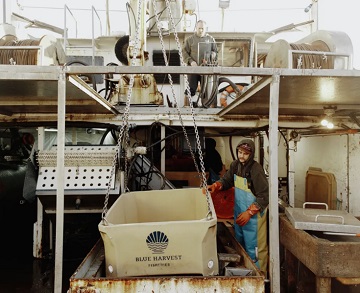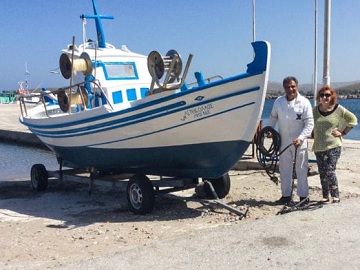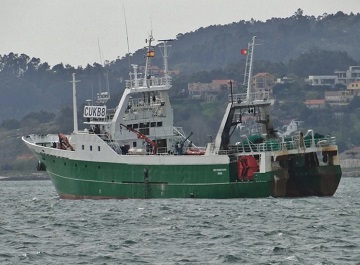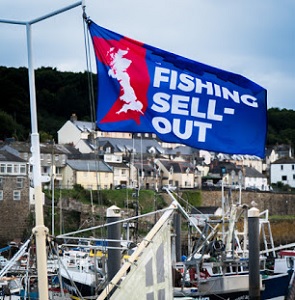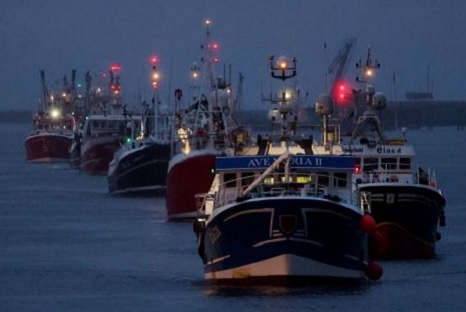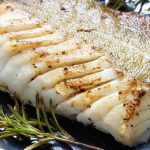Tag Archives: European Union
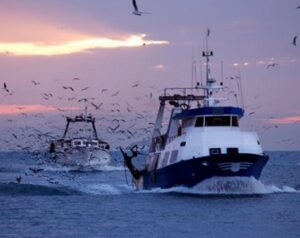
Defra announces EU fishing deal to increase fishing opportunities to £750m
Defra has announced the UK fishing industry will benefit from 140,000 tonnes of fishing opportunities next year, following the conclusion of negotiations with the EU. The deal, announced yesterday, represented a 30,000-tonne increase on pre-Brexit volumes and would present UK boats with opportunities worth over £280m in 2023 in EU waters. This brought the total value of fishing opportunities secured for the UK fleet in 2023 in the three main negotiation forums to £750m, a £34m increase from last year, Defra said. >click to read< 09:15
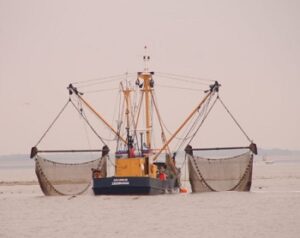
Belgian fishing industry flounders
Between May and June this year, the Belgian fishing industry saw a drop in seasonal catches. In June, just 675 tonnes of fish was landed by Belgian vessels and sold in Belgian ports, according to data published by Statbel, the Belgian statistics agency. This fall has been partially blamed on the rising cost of fuel and expenses. According to forecasts from the National Bank of Belgium, the fishing industry is set to be one of the biggest losers of the year. With fuel prices accounting for around 38% of inputs for the industry, the sector could finish with big losses. >click to read< 10:11
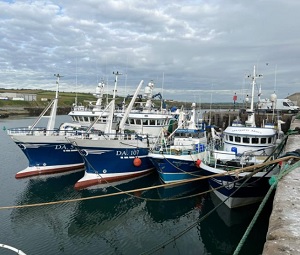
Donegal seafood sector “hopeful” on fuel aid
Fishing and seafood organisations say the are “hopeful” that the Minister for the Marine is about to announce a national fuel aid scheme for the Irish fleet. They believe the Minister now agrees that escalating fuel costs are causing serious difficulties for the industry. EU funding is already in place to support such a scheme, but to date, Ireland had failed to implement one. Aodh O’Donnell of the Killybegs-based Irish Fish Producers Organisation (IFPO) said: “The survival of the entire fishing sector is at stake. >click to read< 08:14
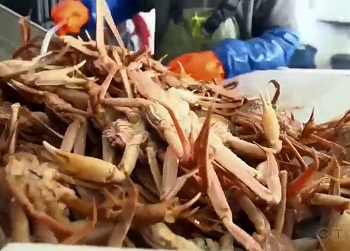
Lobster and snow crab markets fall by as much as 65 per cent
While lobster and snow crab have long been two of the Maritimes’ most popular exports, new data suggests the markets are now falling short. At the wharf in Glace Bay, N.S., fishermen were getting about $7 a pound for lobster by season’s end and about $6 for snow crab. “It wasn’t a good year, lobster-wise or crab-wise for us,” said fishermen’s representative Herb Nash. At Louisbourg Seafoods, where lobster and snow crab have long been their biggest sellers, a record year last year gave way to a difficult 2022. “We were very optimistic coming into 2022 that we would see a replica of 2021, and that couldn’t have been further from what happened,” said Allan MacLean, a senior operations manager at the seafood business. Video, >click to read< 11:38
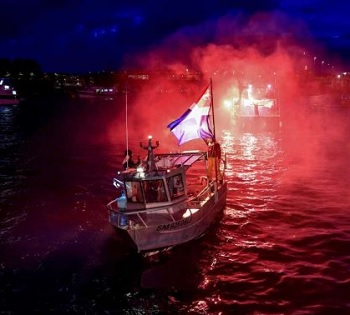
Post-Brexit Fishing: 1,054 Fishing Licenses Obtained, A Fleet Exit Plan for Dockside Fishermen
It is the epilogue of a diplomatic-commercial battle of more than a year between Paris and London, arbitrated by Brussels. France finally obtained 1,054 fishing licenses from the UK and the Channel Islands, allowing holders to continue fishing in their waters, as before Brexit. For the dozens of fishermen who have remained on the sidelines or whose activity has been drastically reduced, the government has planned a “individual support plan”or a fleet exit plan for ships that will be destroyed. >click to read< 07:56
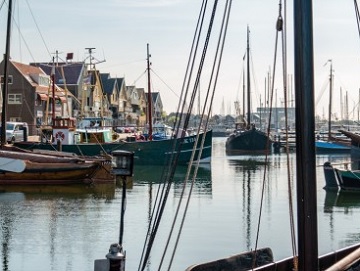
Dutch fisheries will shrink considerably in the coming years
The Dutch commercial fishing fleet will shrink by 10 to 15 percent over the next five years. Many fishermen are getting into money trouble, partly because of declining turnover and high fuel costs. The financial support announced by the government will be too late for some of the fishermen, ABN Amro predicted based on its own research. About a third of fishermen think they could run into financial problems in the coming years. Brexit and the expansion of wind farms has also caused concerns for fishermen. The new distribution of fishing rights means that many fishermen are no longer allowed to catch as many fish as before Brexit. >click to read< 18:55
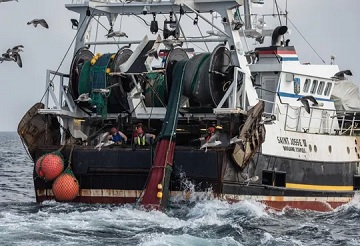
European parliament votes to ban ‘fly shooting’ fishing in part of Channel
While the European parliament does not have the power to ban the fishing method, MEPs said the vote on Tuesday sent an important message to decision-makers about the impact of fly-shooting on coastal fishing communities. The vote on an amendment to the common fisheries policy, involving access to territorial waters, will now be considered by the European Commission, the parliament and EU member states. Last year the UK was accused of allowing vessels using the fishing method “unfettered access” to the Channel without proper assessment of the impact on fish, the seabed or the livelihoods of coastal communities. >click to read< 15:12
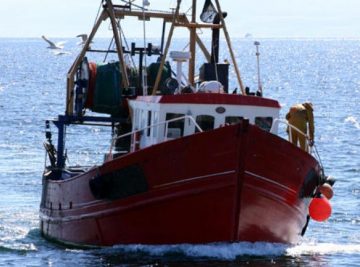
UK fishing industry reports Brexit woes
As well as the issue of quotas for wild-catch fisheries, the report finds, the UK’s seafood industry has been struggling with increased paperwork for exports to the European Union and labour shortages following new restrictions on recruiting staff from the EU. In winter 2021, the APPG on Fisheries released a survey to collate experiences of Brexit as reported by members of the fishing industry. Responses revealed significant and shared concerns around financial losses and the long-term viability of individual businesses, fishing fleets, and other parts of the industry including processors and transporters. >click to continue< 15:30
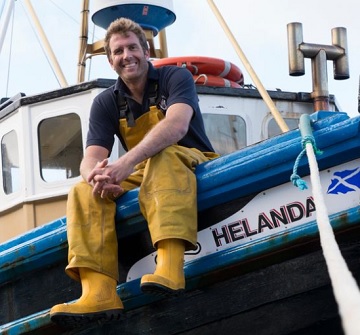
Scots seafood firm blames coronavirus and Brexit as it closes doors after 12 years
Bosses at The Ethical Shellfish Company, based on the Isle of Mull, said the decision had caused “considerable anxiety and heartache” but claimed they had been left with no choice after a period of poor trading. In a blog post shared on Monday, fisherman and founder Guy Grieve claimed the coronavirus pandemic had played a role in the company’s decline, but that its fate had been sealed by the UK’s decision to leave the European Union. When Scotland entered lockdown in March 2020 the company pivoted away from supplying restaurants and chefs like Nick Nairn with fresh seafood and began selling to people cooking at home. TESC was forced to sell its own fishing boats to keep the company afloat during the pandemic but Grieve says the usual supply backup dried up as a result of Brexit. >click to read< 08:15
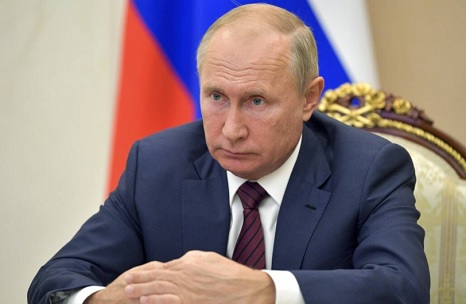
U.S. Bans Russian Seafood, Alcohol in Downgrade of Russia’s Trade Status
The United States will join the European Union and Group of Seven (G7) countries in downgrading Russia’s “most favored nation” trade status, President Joe Biden announced Friday. As part of a new executive order from Biden, the administration will also ban alcohol, seafood and diamonds from Russia in response to its invasion of Ukraine, which is currently in its third week. The move is part of a series of actions by the U.S. and Western nations to chip away at Russia’s economy through sanctions and bans. >click to read< 11:15

Putin blows up Brexit
Whisper it, but Britain and the EU are getting along. While the years following the U.K.’s vote to leave the European Union have been characterized by one-upmanship, failures to communicate and outright disagreements, the days since Russia’s invasion of Ukraine have seen politicians and officials on both sides of the Channel come together to coordinate their response. Disputes about trade rules in Northern Ireland and fishing quotas might be unresolved, but as Vladimir Putin’s forces batter Ukraine, everyone has more important things to worry about. >click to read< 14:49
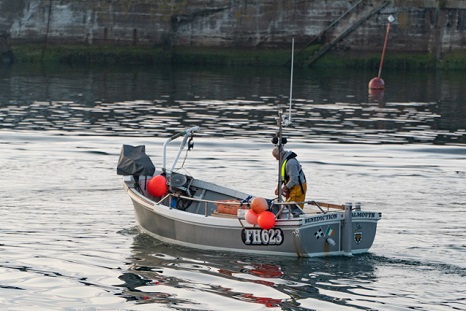
Who wants the disappearance of fishermen? The answers are here.
In recent months, worrying signs have multiplied indicating a desire, sometimes obvious, to make fishermen disappear or, very often, to marginalise them to make way for more lucrative activities in the Blue Economy.,, We are witnessing at sea, with the stranglehold of environmental NGOs on MPAs, the same phenomenon denounced by the historian Guillaume Blanc, in his book “Green Colonialism“: the grabbing of land in Africa, This is the case with the evolution of the marine world towards a “Blue colonialism” which is shamelessly displayed, multiplying MPAs prohibited to fishing, a subsistence and eminently sustainable practice of many oceanic peoples, and which, in Europe and elsewhere , only rarely involves small-scale fishermen in decisions about the oceans, of which they are nevertheless secular managers. >click to read< 07:52
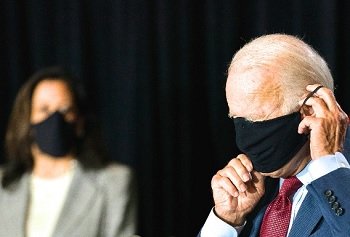
A European Revelation On Climate That Biden Should Heed
Believe it or not, the European Union is set to include nuclear and natural gas on the list of industries eligible for “green” investments. Someone, please pass the smelling salts to the Sierra Club. Wonder of wonders, nuclear and natural gas make the cut. All of this has implications for the U.S., where the Biden Administration is still fantasizing that solar and wind power can soon replace all fossil fuels. If Europe can admit the truth, how about the White House? >click to read< 09:14
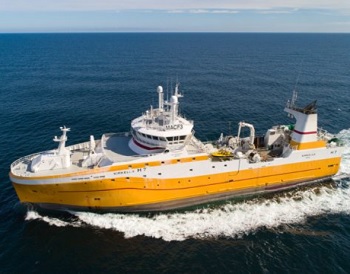
Factory Trawler Kirkella may be sold or moved abroad’ after devastating fishing deal
The Kirkella has been standing idle since December 2020 when the UK lost its rights to fish in Norwegian waters following Brexit. UK Fisheries, who operate the Kirkella, said that the new deal struck with the Scandinavian country leaves the crew with a quota amounting to just one week’s work. The fishing pact will see fleets from both countries able to catch up to 30,000 tonnes of cod, haddock and hake in the North Sea according to the government. But the owners of the Kirkella said it won’t be enough to sustain their ship or crew of 30. >click to read< 10:03

UK secures fishing access and quotas with Norway
Today (21 December 2021) the UK, negotiating as an independent coastal State, has reached an agreement with Norway on fisheries access and quotas for 2022. These discussions mark the start of a new arrangement between the UK and Norway, in which both parties permit some access to each other’s waters and exchange a number of fish quotas in the North Sea and the Arctic. The agreement on mutual access will allow respective fleets more flexibility to target the stocks in the best condition throughout the fishing year, supporting a more sustainable and economically viable fishing industry. >click to read< 09:07
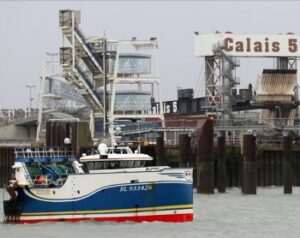
France wants EU to start legal case against UK
Speaking on Friday, Minister for European Affairs Clement Beaune told reporters that France had obtained 93% of the post-Brexit fishing licenses it claims the UK should have granted to its trawlers. According to Maritime Minister Annick Girardin, who spoke alongside Beaune, France was still pushing for a further 73 licenses to fish in British waters. Paris says it will not drop its protests until all of the outstanding licenses are granted. >click to read< 13:30

Plymouth’s fishing industry is being ‘screwed over
The fishing industry has been “screwed over” by Brexit deals and unnecessary bureaucracy, according to Plymouth MP Luke Pollard. Promises to take back control of British fishing waters were a big part of the Leave campaign before Brexit when the government suggested more than £140 million worth of the fishing quota would be regained from the EU. Analysts suggest the real figures are a small fraction of that. Mr Pollard said a number of factors are hitting the fishing industry in places like Plymouth. >click to read< 08:37
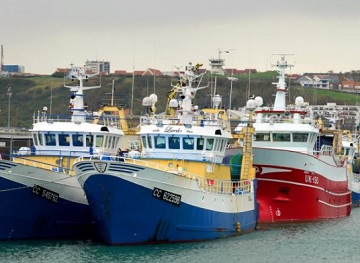
French minister says, We still want a ‘few dozen’ more fishing licences
France has received 93% of the fishing licences it requested but wants Britain to issue a few dozen more, It comes after the UK and Jersey Governments on Saturday granted further licences to French fishing boats in an apparent attempt to resolve the long-running dispute over their post-Brexit rights to trawl British waters, and as technical talks over several more vessels continue. “We still have a few dozen to obtain, around 60. We are looking at every file that remains. We will not let down any of these fishermen.” >click to read< 14:36
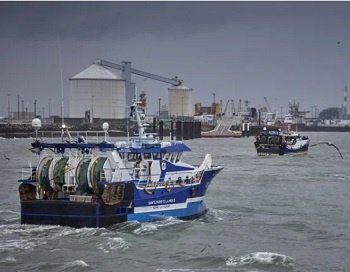
EU deadline in UK-France fishing row set to expire
An EU deadline for Britain to grant licences to dozens of French fishing boats is set to expire today, with Paris threatening legal action unless a last-minute compromise can be found. France says that 104 of its boats still lack licences to operate in British and Channel Island waters that should have been granted under a Brexit deal Britain signed with the European Union in December last year. Britain denies discriminating,,, >click to read< 11:49
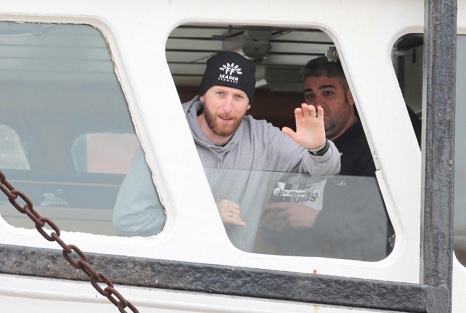
Impounded fishing trawler docks in Shoreham – Donegal skipper thanks supporters
The scallop dredger Cornelis Gert Jan left Le Havre on Wednesday after being held there since last week, when France accused it of fishing in its waters without a proper licence. “We are pleased to have this matter resolved and delighted that our crew and vessel are now able to return home. The crew have acted with calmness and professionalism throughout the entire incident. photos, >click to read< Donegal skipper ay centre of fishing row thanks supporters – In a message to west Donegal independent councillor, Micheál Cholm Mac Giolla Easbuig, Mr Ward said: “Just busy now trying to get all ready to get to sea. “Please tell everyone at home that I am so grateful for all their messages and support.” >click to read< 09:51
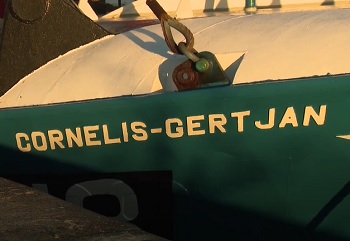
France lets UK fishing trawler depart – Vessel reappears on licensed list amid claims of an admin error
A director of a British fishing trawler that was impounded by French authorities in a row over post-Brexit fishing rights, said he was relieved the vessel had been allowed to leave and would set off for home later. The Scottish-registered scallop dredger, the Cornelis-Gert Jan, had been held in Le Havre. >click to read< – British Trawler detained in fishing row reappears on licensed list amid claims on admin error – When the Cornelis-Gertjan was detained last week the owners claimed their vessel was legally fishing for scallops in EU waters. Now the Cornelis-Gertjan is back on the list and in the spreadsheet section marked ‘EU Waters Access’ it says “YES”. Video, >click to read< 14:32

UK boat detained by France amid fishing rights row
A British trawler has been seized by France and another has been fined, amid an escalating row over post-Brexit fishing rights. French maritime minister Annick Girardin said the ships were cautioned during checks off Le Havre overnight. She said the first did not comply right away and the second was not allowed to fish in French waters so was detained. >click to read< 08:28
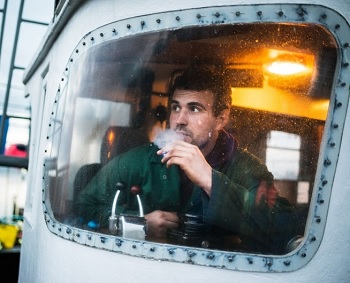
Brexit, an “ocean of possibilities”? British fishermen mixed
A heavy weather warning was announced this weekend in the North Sea. Rain and wind are already sweeping Peterhead and its pink granite dwellings. Located in the east of Scotland, the UK’s largest fishing port in terms of fish caught sees its boats returning for shelter. Except Peter Bruce, who will stay at sea until the last moment. ” We use so much gasoline to reach the whitefish fishing grounds that it is not financially worthwhile to come back for six to eight days.”,,, While Peter Bruce usually fills his holds with 50 tonnes of fish, he sometimes has to make do with 35 tonnes. Particularly since the 1is January. >click to read< 14:53
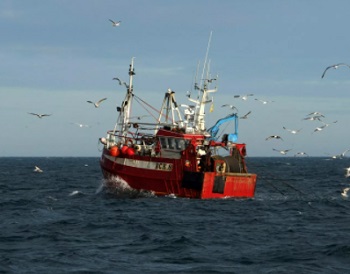
Danish Fisheries Hit by Crisis in Aftermath of Brexit

Fishermen’s urgent plea to Boris Johnson over Brexit and funding
The government has set aside a £100million investment fund for the industry, and has promised to replace funding that came via the EU. Now the local fishermen, who number around 600, and the workers who depend on the industry, want to see Brixham land the money to safeguard the future of their historic industry.,,, Fishermen were some of the strongest supporters of breaking away from the European Union, convinced by the potential to take back control of the UK’s waters, and harvest more of the fish in them. But many now see the government’s trade deal and fishing agreement with the EU as falling far short of what was promised. >click to read< 08:55






